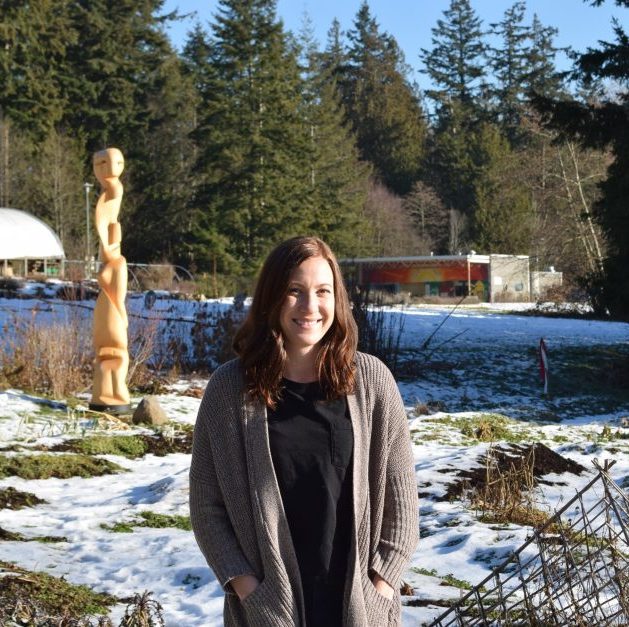LFS 496 Student Profile: Carly Koenig, Food Skills Education Assistant
Work Placement: Food Skills Education
Supervisor: Seth Friedman
What do you study?
I am currently finishing my Masters in Public Health through Oregon Health and Science University and working on my diploma in Health Education at UBC.
I chose public health as my academic path because I feel that all people deserve health, happiness and safety. I think it is our duty to work with vulnerable people and communities to ensure access to quality food, education, housing, and a safe environment, which are the main factors which determine health.
As a public health student, I am learning how to look at population health and what its determinants are. To support my knowledge of this discipline, my diploma in Health Education is examining how people have access to information about their own health and how we can promote health within our communities. With this internship, I was able to fuse the two programs by looking at the health of our community and how we support and encourage that by offering sustainable living skills workshops.
What was your work placement?
As a Food Skills Education intern, I was supporting Seth Friedman on developing the workshop program at the Farm. The UBC Farm offers a variety of workshops under their Sustainable Living Skills mission. We’ve hosted workshops on canning, soil management, and composting, to name a few. These workshops offer people the opportunity to learn more about foraging for their own food, cooking, or even beekeeping – teaching people to come back to traditional skills.
Essentially, my role was to identify educators within the community, reach out to them, form relationships, assist in organizing workshop specifics and promote workshops through various media channels. I would also attend the workshops as a liaison between the Farm and the educator. This allowed me to identify any gaps we could improve for future workshops.
What was your favourite workshop?
I liked that there was always such a variety of workshops, which allowed everyone in the community to find a topic they are interested in. My favourite workshop I attended was Soil Management. I was pleasantly surprised how engaging it was even though I had no previous knowledge about soil. As much as I learned about soil, I got to see how the workshops are a great tool for connecting people to the Farm. They create opportunities for people to be involved, interact and learn. This experience had also allowed me to assess the future content of workshops from a different perspective. Apart from our mission, I started to take consideration of how they could be relevant to different age groups and education levels.
What was the most interesting thing you learned throughout your work placement?
The most interesting thing I encountered throughout my internship was the importance of developing relationships within the community. It takes time to develop trust and communication with community members, workshop presenters, and even with businesses, but once you do, it is well worth the investment. For example, we offered a foraging workshop and catered lunch to Nature’s Path, a donor and great supporter of the Farm. They had a really positive experience connecting with the space and the work we do at the Farm, and it strengthened our relationship with their organization. The workshop program at the Farm is a great tool for connecting us to the community, and connecting community members to each other through the learning and sharing of skills.
What is the UBC Farm to you?
The Farm to me is a very welcoming, peaceful, beautiful environment. It is a dynamic space where you can come for so many reasons. You could be here to do some hard work, like physical labour, or you could be here to find peace. I, for instance, find a lot of peace in volunteering. You can come here to learn, eat, and meet people. It is a sustainable space that brings the land and people together. We are lucky that Musqueam people have allowed us to share this space and invite the community to enjoy the land. The food system is very complicated, but if we can encourage our community to be engaged in activities surrounding education and food justice, we may decrease the disparities of access to food, and improve the quality of food and the locality of our food. The Farm is involved in this dynamic system as a dynamic setting and that intrigues me.
What is your favourite crop that grows at the Farm?
One of my favourite volunteer shifts was harvesting blueberries. We were invited to enjoy some blueberries while we worked, but I might have overdone it. I left the shift feeling like a blueberry myself. Also, almost anything in the indigenous garden, but particularly oca.

Comments are closed, but trackbacks and pingbacks are open.